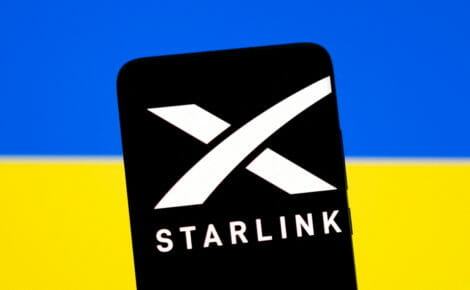SpaceX chief Musk warns that its Starlink system could be ‘targeted’ in Ukraine

Starlink logo is seen on a smartphone in front of displayed Ukrainian flag in this illustration taken February 27, 2022. REUTERS/Dado Ruvic/Illustration
SAN FRANCISCO — SpaceX chief Elon Musk warned there was a high chance the company’s Starlink satellite broadband service could be “targeted” in Ukraine, which has been hit by Russian invasion.
The warning came days after an internet security researcher warned that devices receiving satellite communications could become “beacons” that Russia could target for airstrikes.
“Important warning: Starlink is the only non-Russian communications system still working in some parts of Ukraine, so probability of being targeted is high. Please use with caution,” Musk tweeted.
He asked users to “turn on Starlink only when needed and place antenna away, as far away from people as possible” and “place light camouflage over antenna to avoid visual detection.”
On Saturday, Musk said Starlink was activated in Ukraine and SpaceX was sending more terminals to the country, responding to a tweet by a Ukraine government official who asked Musk to provide the embattled country with Starlink stations.
READ: Elon Musk activates Starlink internet service in Ukraine
On Monday, Ukraine said it had received donated Starlink satellite internet terminals, but an internet security researcher warned these could become Russian targets.
“…if #Putin controls the air above #Ukraine, users’ uplink transmissions become beacons … for airstrikes,” John Scott-Railton, a senior researcher at the University of Toronto’s Citizen Lab project, tweeted.
“#Russia has decades of experience hitting people by targeting their satellite communications,” he added in a series of 15 tweets detailing the risks.
READ: Starlink internet terminals available to Ukraine with friendly safety warning
Russia and Ukraine have agreed on the need to set up humanitarian corridors and a possible ceasefire around them for fleeing civilians, both sides said after talks on Thursday, in their first sign of progress on any issue since the invasion, which Moscow calls a “special operation.”